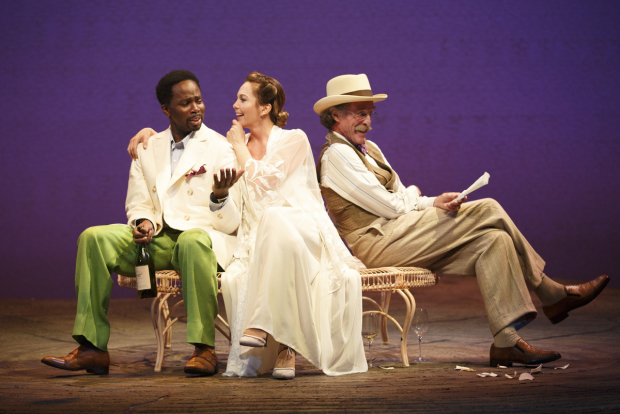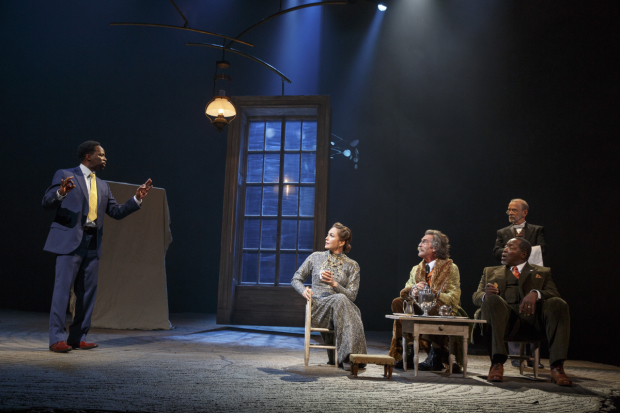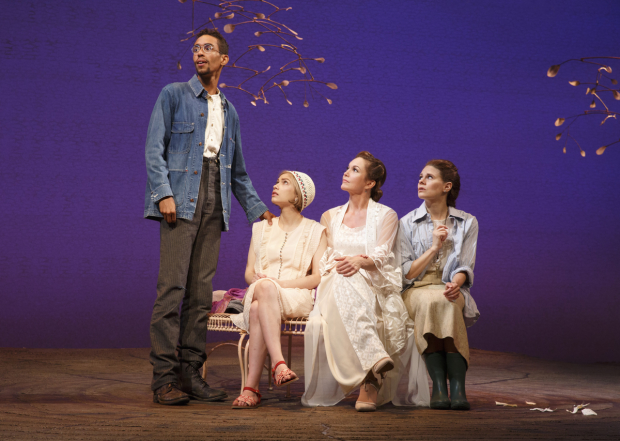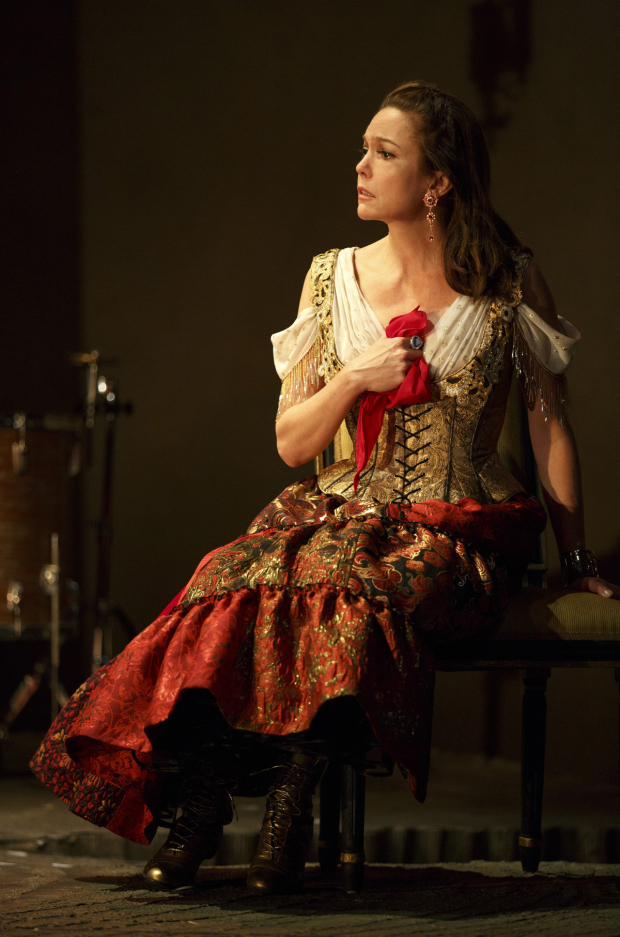The Cherry Orchard

(© Joan Marcus)
The tragicomedy of loss is a timeless human experience, but that doesn't mean stories of loss will always resonate. That sad truth is readily on display at the American Airlines Theatre, where Roundabout Theatre Company is presenting Stephen Karam's tepid new adaptation of Anton Chekhov's The Cherry Orchard. Despite bold design choices and solid performances, there's something a little too precious about this version, leaving us cold and yearning for a stronger perspective. Chekhov's prescience only politely brushes against us rather than punching us in the gut, as it should.
The play begins with Lyubov Ranevskaya (Diane Lane) returning home from Paris to the cherry orchard owned by her family for generations. Her brother, Leonid Gaev (John Glover), still lives there along with her adopted daughter, Varya (Celia Keenan-Bolger), and the ancient butler, Firs (an appropriately dotty Joel Grey). Newly wealthy businessman Yermolai Lopakhin (Harold Perrineau) comes from a long line of serfs attached to their family, so he regularly visits. Due to the deadly combination of a shifting economy and obstinate management, the estate is hopelessly in debt and will soon be sold at auction; but Lopakhin has a plan to parcel up the land and lease the plots as summer homes for Russia's emerging middle class, providing the family with a steady new source of income. Of course, the aristocratic Ranevskaya and Gaev find the whole idea of renting their land to vacationing shopkeepers terribly vulgar.

(© Joan Marcus)
Class is very much at the center of this comedy-drama, Chekhov's last, which was written just 14 years before the October Revolution that gave rise to Communism in Russia. Class is also a subject that the American theater has struggled to convincingly convey in recent years, Karam's The Humans (about a downwardly mobile Irish-American family) being one of the major exceptions. Karam would seem like a strong candidate to adapt this century-old text for a contemporary audience, but his choices are so conservative that the piece never escapes its museum display case.
Director Simon Godwin's highly mannered staging (stiff blocking and stagey readings) certainly helps to banish modern economic anxiety to Siberia, while the casting ambitiously brings the issue of race into the equation: A black Lopakhin faces off with the white family who used to own his ancestors (he refers to them as "slaves" rather than "serfs"). Instead of having one difficult issue to address, the play now has two and they both feel short shifted.
Granted, the racial politics of the play are complicated in the considerable form of a scenery-devouring Chuck Cooper, a black actor who plays the buffoonish neighboring landowner Boris Simeonov-Pischik. Clearly, this is not just the story of a white aristocracy and black bourgeoisie. Nor is it completely colorblind, as we can see from the fourth-act image of Yasha (Maurice Jones) and Lopakhin, two black characters toasting with champagne as a formerly powerful white family cedes control of the cherry orchard. There is something going on here racially, but the production is never clear exactly what.
Don't look to the actors to illuminate this point: Perrineau's fiery performance certainly speaks to the frustration of being the smartest man in the room who is nevertheless consistently ignored by virtue of his lowly birth, but that is a must for every Lopakhin. Lane and Glover both give textbook portrayals of their characters, while Tavi Gevinson is competent in the thankless role of Ranevskaya's younger daughter, Anya. Keenan-Bolger gives the most moving performance of the night, bravely restraining Varya's crushing disappointment until she physically cannot anymore. Even then, she maintains an admirable dignity.

(© Joan Marcus)
Of the whole cast, Kyle Beltran most stands out for his distinctly modern approach to perpetual student Pyotr Trofimov. "Your ancestors owned the people who actually built this orchard and made it work," he tells Anya in his best "woke" voice. "Your mother, your uncle, none of you get that you're living on credit accrued at other people's expense." You can practically see him preaching on the quad at Yale circa 2016.
That's not to say the production ever betrays a specific time period. Nico Muhly's original music (performed by a live band during the transitions) is very contemporary with its space-age harmonics, but also seems to reference Stravinsky at key moments, like when Lopakhin seizes control of the estate. Scott Pask's spare set of giant mobiles suggests a crumbling manor house surrounded by snow-covered cherry trees. Michael Krass' shifting costume plot exposes a vast generational divide: While Gaev's high collars and flamboyant brocade robe hearken to the turn of the last century, Lopakhin's suits are crisp and fashionable — a 21st-century dandy chic that wouldn't feel out of place on the pages of GQ. The team abandons simplicity entirely for the third-act masquerade ball: Everyone wears deep reds, purples, and greens with gold embroidery, decadent fabrics that look even richer under Donald Holder's intimate and dramatic lighting. In color and composition, it all looks very much like a Delacroix painting.

(© Joan Marcus)
Such flashy design choices serve to obscure the fact that Karam's adaptation is fairly lackluster and unadventurous. It does a great job of highlighting the class dynamics of Chekhov's age, but only tenuously touches on those of today. And unlike the Blakes of Karam's Humans, it is difficult to sympathize with Ranevskaya and Gaev's feelings of loss since they seem to be so overwhelmingly self-inflicted. Roundabout Theatre Company has attempted to have its cake and eat it too by producing a traditional Cherry Orchard that is also "refracted through the sensibilities of 21st-century America," as Artistic Director Todd Haimes writes in a program note. Unfortunately, this approach has resulted in a series of half choices that only serve to dilute the play and keep the audience at arm's length.











